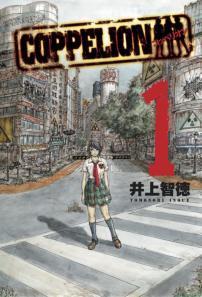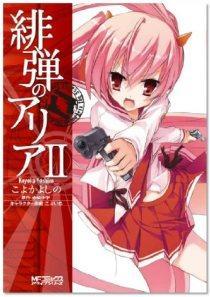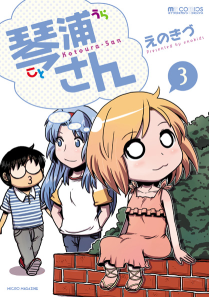


Amanda Haley had found herself interested in anime and manga for a while, but it was an event put on by the now defunct JManga that has thrust her into a spot where she’s currently working in the manga industry, translating manga like Tomonori Inoue’s Coppelion and working for the Digital Manga Guild.
I spoke with Amanda last Wednesday about manga translation, how she got into it, and more.
So talk a little about yourself and any translations you’re working on right now.
I’ve been translating manga for about a year now. I do a series called Coppelion, which is serialized on Crunchyroll Manga. I’ve also done some books for Digital Manga Guild, including the manga adaptation of Aria the Scarlet Ammo (forthcoming) and a couple of one-shots. And I’ve also done some Harlequin recently.
How did you get interested in manga? How did it start for you?
I’ve kind of been a fan of anime and manga since I was in middle school, so for a long time I’ve kind of been an otaku. It was only recently that I started translating, like a year ago when JManga hosted the Manga Translation battle. I thought, “You know, it’s finally time, I’ve been learning Japanese, so I guess I should finally start practicing translations,” so I put in an entry for all three of the series that they had the contest for and got in for Coppelion and I’ve been attached to that series since.
How was the Manga Translation Battle? What was the experience like?
Well for me it was my first time translating manga, so it was kind of intimidating. I think that they had around 100 entries for it this year, and last year I think they had about the same amount — I’m kind of guessing from what I’ve read from the judges — so basically what they did was they put up the first chapter of a couple of series and you had to write out the script and from all the entries they received they would pick about a dozen finalists, so there would be about 3 or 4 finalists for each series. Then they had public voting, they lettered all the finalists’ entries, and then put them up on the website.
How long did you have to work on translating the works?
I took a pretty long time last year — like a couple weeks honestly — because it was my first time, I had no idea what I was doing. They did it again this year, not with JManga, but with Otaku Mode and that one, I took maybe 5 hours on, I didn’t take enough time on it.
Well generally, how was the entire experience? Was it worthwhile, how did it feel to finish it, and how did it feel to know you were one of the winners of it?
It was completely worthwhile. I mean, just seeing the script on the pages for the first time was really nice *laughs* and you learn a lot about translating just through doing it and again seeing it in the actual bubbles on the comic pages is a lot different than seeing it just as a script in Word. And the great thing about that contest is that the overall winners get feedback from judges like William Flanagan and Deb Aoki, and they have some great things to say about translating manga and the pitfalls that you can run into, and what publishers are looking for.
What’s the general process of translating manga, from when you’re assigned to actually get started working on it and when you’ve finished translating?
Well first you read through the book first, and look for important emotional beats and any parts you might have trouble with. It’s kind of straightforward. I mean, it really depends on the book that you’re working on. You have to, you know, if it’s a comedy you have to focus on keeping things light and funny, or if it’s serious you have to adjust the tone based on that. Usually you start off with kind of a draft translation and then go back through it and revise it, make sure there’s characterization, and any terms are more consistent. And so on and so forth.
What’s been the challenges of working as a freelance translator?
Kind of managing your schedule and getting used to kind of the business side of things…like remembering to send invoices *laughs*.
When you start out, you probably already have another job already so it’s hard trying to do all the manga that a company might want you to do — also keeping up with your own job and kind of transitioning into a spot where you can do both jobs.
Since you’ve been working with different companies, are you presented with different guidelines on what’s acceptable or you don’t have to worry about any of that, you just get to translate the manga?
You do kind of have to worry about it. For instance there are different standards for spelling “all right”. Like, when I was working with Digital Manga Guild, in their guidelines they say they’ll spell it as two different words, all right. When I was doing the scripts for Coppelion I tried to do it that way because that was how I had been taught at DMG, but when finally the books went up on Crunchyroll I saw that they had been changing it to just one word I’m like, “Oh, oh crap! I guess I should be doing it from that way from now on!” *laughs*
How is it like working on a continuing series (like Coppelion)?
It’s really weird because we’re 20 volumes in and that’s where the serialization is now, but we’ve only translated up to like Volume 12 of the backlog. So when I’m translating the serialized chapters and they start referencing things that happen, say like somewhere in Vol 15, I haven’t necessarily read that or translated it yet, and that makes it a little bit difficult because you’re kind of almost translating backwards so you have to be really careful with keeping things consistent.
What’s been the one thing you’ve learned from working in the manga industry?
I guess the biggest impression it’s made on me since I started working in the industry is how much work it is! *laughs* Like you read a volume of manga in maybe like an hour or even less for some people, but it takes a lot of work just to put it together because you have the translator, the letterer, and the editor, and then the people in Japan read through what you’ve done and give you any corrections. It’s a pretty long process.
Last question: Are there any manga series you’ve had the chance to read in Japanese that you would like to see released in the US?
I’m reading Nanika Mochigatte Masuka, which is by Mohiro Kitoh — he’s the guy who did Bokurano, that’s a pretty great series — anything by Satoshi Mizukami which he has some things coming out now, he’s the author of Lucifer and The Biscuit Hammer, and Assassination Classroom is pretty great.

